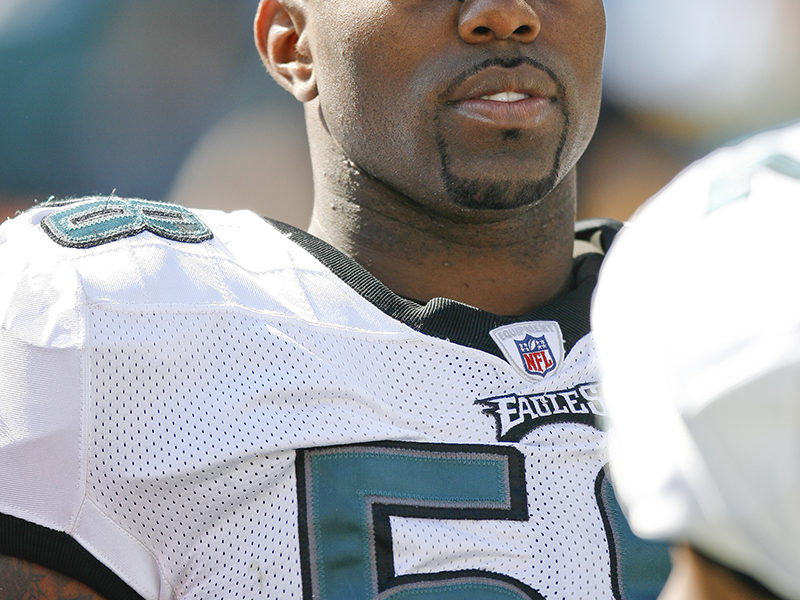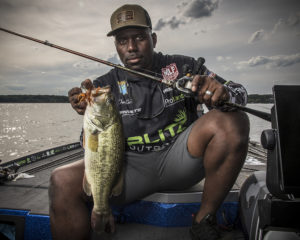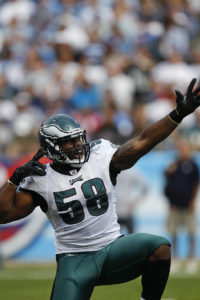
Philadelphia Eagles defensive end Trent Cole #58 during the singing of the national anthem before the NFL game between the Tampa Bay Buccaneers and the Philadelphia Eagles on October 11th 2009. The Eagles won 33-14 at Lincoln Financial Field in Philadelphia, Pennsylvania. (Photo By Brian Garfinkel)
Even a casual Philadelphia Eagles fan can tell you the team’s all-time sack leader is Reggie White, right?
How many can tell you who is second to White on the team’s all-time sack list? No, it’s not Clyde Simmons, White’s pass-rush partner in the late 80s into the 90s. It’s not Hugh Douglas, or Brandon Graham, either.
The answer is Trent Cole, the team’s 2005 fifth-round draft pick out of Cincinnati, who recorded 85 1/2 of his career 90 1/2 sacks as an Eagle from 2005-2014.
Cole, who was named to the All-Rookie team in 2005, the Pro Bowl in 2007 and 2009 and was All-Pro in 2009, is also among the Eagles leaders in tackles for a loss, with 124 of his career 133, and forced fumbles, with 19 of his career 21.
How impressive is 90 1/2-133-21 for a defensive end? Consider these comparisons: Douglas, in the same 10 years went 80-64-13. Graham, in 12 years and counting, is at 59-105-19.
The Eagles will acknowledge Cole’s accomplishments later this season when he will go into the team’s Hall of Fame along with Douglas at halftime of the team’s November 27th Sunday night game against the Green Bay Packers.
Six years after he finished his career in Indianapolis, with the Colts, JerseyMan Magazine caught up with arguably the most underrated player in Eagles history. He’s still living in Mullica Hill, New Jersey with his wife Paige, their three children, six-year-old Teigan, four-year-old Sutton and two-year-old Trent III and a fourth on the way. And he’s still an avid outdoorsman, a skill he’s taken to another level while also running a grain farm on his property in South Jersey.

JerseyMan: Do you ever look back at your career and realize what you did and where you rank among some of the all-time greats?
Trent Cole: It’s hard for me to look back because I was never a stat guy. I’ve had people tell me. But I was the kind of guy that lived by, ‘What could I do tomorrow?’ I was always in competition with myself, not anyone else, myself. I’m also humble about that stuff. I have friends and teammates tell me all of that and it’s nice to hear it. But I never paid attention to any of it, especially when I was playing. Now, it is nice to hear all of that.
JM: Do you feel you were underrated? That a lot of people don’t know just how good you were?
TC: I think everyone knew how good I was. It just wasn’t put out there. But [teams] knew. I was getting doubled-teamed and triple-teamed. I was getting triple-teamed, I’m telling you. When other players tell you, after the game, ‘They were keying on you the whole game,’ they knew.
JM: You were really durable during your career. You only missed five games in 12 years. That’s pretty remarkable.
TC: That comes from going 100 miles per hour every play. I always kept moving, kept my feet moving. If you get caught standing around a pile, you know what happens. That’s when injury happens. I was always going to be on the bottom of the pile or on top of the pile, not standing around.
JM: It had to be more than just that. You had to keep yourself right, stay in shape, watch your diet, all of that.
TC: I did. I was big on active recovery. If I did get hurt, I wasn’t going to let it keep me out.
JM: The Eagles are going to honor you in November, putting you into their Hall of Fame. What does that mean to you?
TC: It’s awesome. It’s a great feeling. I just always wanted to be a good teammate and lead by example. I just wanted people to understand me, but it’s not really for them to understand me. I just wanted to set a good example and lead by example. But I can’t be more appreciative of the Eagles and of the Eagles fans.
JM: You’re going in with Hugh Douglas. Wasn’t Hugh a mentor for you when you first came into the league?
TC: I’ll never forget. He was the guy who told me, ‘You got it, you got it, man.’ He would always get on me about using my hands. He would tell me I had to use my hands more and he was 100 percent spot on.
JM: You go back a ways with Hugh.
TC: You won’t believe this, but I was the ball boy at his college [Central State in Ohio]. From my house, I could see the football field. It was in the middle of nowhere. It was a country school, and I was a country kid. But my mom was the cheerleading coach, so I was able to go over there. And I was the ball boy.
JM: What’s your fondest moment or memory? Is there anything that stands out above the rest?
TC: I’ll never forget that game against the Giants (in 2010) when DeSean [Jackson] brought the punt back for a touchdown to win the game. That was crazy. And then getting to the [NFC] championship game [in 2008], even though we lost [to Arizona]. I played my heart out in that game. I never played harder in my life.
JM: Take me back to your draft, you slipped to the fifth round. What happened there? You were sick, or hurt, right?
TC: I had pneumonia during the Combine and almost died. I was 260 pounds, running a 4.5 [in the 40] getting ready for the Combine. I was first round all day, all day. Then I got sick and couldn’t participate. My weight dropped to around 230. Fortunately, the Eagles still took a chance on me, even though they didn’t see me.

Philadelphia Eagles defensive end Trent Cole #58 reacts after a play during the NFL Game between the Tennessee Titans and the Philadelphia Eagles. The Titans won 37-19 at LP Field in Nashville, Tennessee on Sunday October 24th 2010. (Photo By /Brian Garfinkel)
JM: Did you use that as any extra motivation?
TC: I was a man on fire. Something was in me to drive me and make something out of it. I was always going to go as far as I could.
JM: You came out of the University of Cincinnati. What was it like for you to watch those Bearcats get some national recognition last fall and be in the college football playoffs?
TC: It was a big thrill. We came a long way. We’re up there now. And I think we’re there to stay. We’ve always had guys come out and play well, a lot of lower-round picks, too. But now the school is getting recognized.
JM: You were always an avid hunter and outdoorsman when you played. Now, you have a TV show, Blitz Outdoors, on the Sportsman Channel. How did that happen?
TC: I grew up hunting and watching shows about hunting on television. I started thinking about that and thought, ‘We can do this.’ I got to the NFL and had some change in my pocket, I got my friends and we started filming us. We got some cameras and we started filming our hunts. It got bigger and bigger and now we have a staff. It became a production company. Now we’re on national television.
JM: You played your last two years in Indianapolis, with the Colts, which is closer to where you grew up in Ohio. But you came back to live in New Jersey. I guess you liked it here?
TC: I love it. People complain about the high taxes and whatever, but I love it. I love living here in Jersey, South Jersey. I love South Jersey. It’s a great place to raise your family. I thought about going home, but my wife wanted to stay and I’m glad we did. Like I said, it’s a great place for a family. And it reminds me a lot of being back home.

